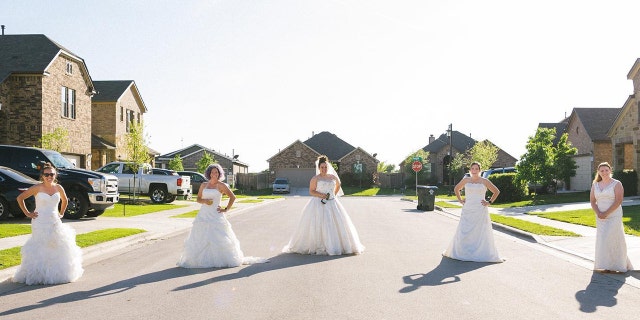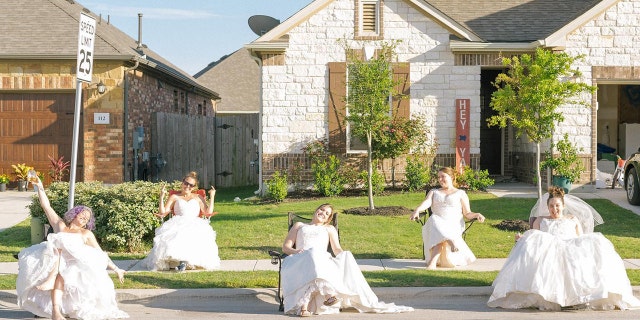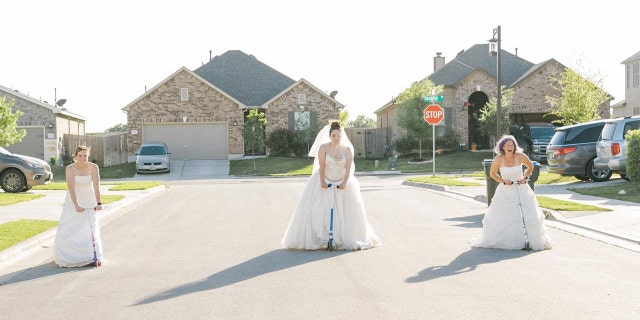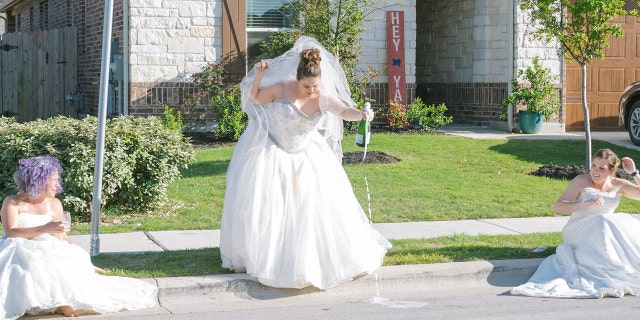Texas women stage 'wedding dress Wednesday' photo shoot while social distancing - Fox News |
- Texas women stage 'wedding dress Wednesday' photo shoot while social distancing - Fox News
- How women dress for other women - AlterNet
- Billionaire Spanx founder loans out her wedding dress to strangers—including brides affected by the pandemic - CNBC
| Texas women stage 'wedding dress Wednesday' photo shoot while social distancing - Fox News Posted: 07 Apr 2020 11:02 AM PDT Get all the latest news on coronavirus and more delivered daily to your inbox. Sign up here. And they all quarantined happily ever after. A group of women in Texas recently rocked their wedding dresses once again for a socially-distanced photo shoot to lift spirits in their tight-knit neighborhood during the coronavirus pandemic.  A group of women in Texas recently rocked their wedding dresses once again for a socially-distanced photo shoot to lift spirits during the ongoing COVID-19 outbreak. (Elyssa Seibel/A Joy Story Photography) Last week, professional photographer Elyssa Seibel gathered five friends in her Georgetown neighborhood for a lighthearted "wedding dress Wednesday" portrait session. Seibel, who owns and runs A Joy Story Photography, told Fox News that she and her pals miss spending time together during the ongoing quarantine, and wanted to get together in a safe way. AMERICA TOGETHER: UPLIFTING STORIES OF AMERICANS FIGHTING THE GOOD FIGHT  Moving forward, Seibel said she hopes that the pictures also bring joy to others and hopes to see "lots of other wedding dress Wednesday photos" in the future. (Elyssa Seibel/A Joy Story Photography) "I convinced five of them to put on wedding dresses and come outside for a social distancing photo shoot! We were hoping to make ourselves and our neighbors laugh – but we are really glad that we have brought smiles to so many people this week!" Seibel told Fox News on Tuesday of the unique photo op, which has since made waves on Facebook. Positioned at least six feet apart in the series of photos, friends Jamie Egloff, Bryce Ellerbroek, Jaime Sladek, Shannon Thomas and Nina Wagner were all smiles in their bridal gowns as they posed in front of their houses, popped champagne and even rode scooters down the street, Good Morning America reports.  "We were hoping to make ourselves and our neighbors laugh – but we are really glad that we have brought smiles to so many people this week!" Seibel told Fox News. (Elyssa Seibel/A Joy Story Photography) FOLLOW US ON FACEBOOK FOR MORE FOX LIFESTYLE NEWS Moving forward, Seibel said she hopes that the pictures also bring joy to others and she hopes to see "lots of other wedding dress Wednesday photos tomorrow!"  On April 1, photographer Elyssa Seibel gathered five friends in her Georgetown neighborhood for a lighthearted "wedding dress Wednesday" portrait session. (Elyssa Seibel/A Joy Story Photography) "I have seen so many industries destroyed by this pandemic, including my own," the photographer said. "But I have been really inspired by all the photographers who have been finding ways to use their talent to make some happiness for their communities – and that's exactly what I wanted to do." CLICK HERE FOR FOX NEWS' CONTINUING CORONAVIRUS COVERAGE | |||
| How women dress for other women - AlterNet Posted: 14 Mar 2020 12:00 AM PDT "If you can't be better than your competition," Vogue editor Anna Wintour once said, "just dress better." Indeed, new research suggests that women don't just dress to be fashionable, or to outdo one another when it comes to enticing men. They also dress for other women. But Wintour's quote misses some of the nuances that go into the outfits women choose with female friends, co-workers and acquaintances in mind. It's not just about dressing better. In fact, my colleagues and I found that women can be motivated by another factor: avoiding the slings and arrows of other women. The psychology of women's wardrobesMy social psychology lab explores how women navigate their social relationships with other women. With my co-authors, Oklahoma State graduate student Ashley M. Rankin and Arizona State University graduate student Stefanie Northover, I recently studied what goes into women's fashion choices. Of course, both men and women consider a variety of concerns when selecting their outfits: cost, fit, occasion. Existing psychological research on women's clothing choices tends to center on how women dress for men – the makeup, shoes and colors they select to impress the opposite sex. But we posed a different question: How might women dress for other women? For over a century, psychologists have been interested in competition between men. Only over the past few decades have researchers started to seriously look into how women actively compete with one another. The competition isn't necessarily nice. Like men who compete with one another, women can be aggressive toward other women they're competing with. But it's rarely the physical kind. Instead, social scientists like Joyce Benenson, Kaj Bjorkqvist and Nicole Hess have shown that women are more prone to rely on social exclusion and reputation-damaging gossip. So we wondered: Do women ever dress defensively – to mitigate the chance that other women might go after them? We know that women who are physically attractive and who wear revealing clothing are more likely to be targets of same-sex aggression. For example, psychologists Tracy Vaillancourt and Aanchal Sharma found that women behaved more aggressively toward an attractive woman when she was dressed in a short skirt and low-cut shirt than when that exact same woman wore khakis and a crewneck. We reasoned that women would be aware of this dynamic – and some would try to avoid it. So we tested this theory in a series of experiments. Dressing defensivelyFirst, we studied whether people would expect women to be aggressive toward attractive, scantily clad women. We asked 142 people to read a scenario about two women, Carol and Sara, who met for coffee after connecting on a friend-finder app that was like Tinder, but for platonic relationships. We asked the participants how they thought Carol would treat Sara during an otherwise uneventful coffee date. Although the scenarios were the same, some people saw a photo of Sara that depicted her as an attractive woman wearing khakis and a crewneck; others saw a photo of her wearing a low-cut shirt and short-skirt; and a third group saw her in the more revealing outfit, but the image had been photoshopped to make her look less physically attractive. We found that when Sara was attractive and revealingly dressed, people expected Carol would be meaner to Sara. We then wanted to see whether women would also act on the awareness of this dynamic, so we ran a series of experiments with college-aged and adult women from the U.S. For a set of two studies, we instructed female participants to imagine that they were going to meet new people in a professional setting, like a networking event, or at a social gathering, such as a birthday party. They were also told to imagine the event as either single-sex or mixed-sex. In the first, we asked women to draw their ideal outfits for those events, and we later had undergraduate research assistants measure how much skin was revealed. In the second, we asked women to choose outfits from a menu of options – akin to shopping for clothes online. Each of the possible outfits had been rated for modesty by a separate set of participants. In both studies, women chose more revealing outfits for social events than professional ones. This wasn't surprising. But interestingly, women chose less revealing outfits to meet up with an all-female group – regardless of whether it was a professional or social setting. But wouldn't the more revealing clothing in mixed-group settings simply reflect their desire to attract men? Not exactly. Not all women dressed the same for other women. The women who rated themselves as more physically attractive were the ones who chose more modest outfits when meeting up with a group of women. This supports the idea that they were dressing defensively – to avoid bringing attention to themselves and being targeted by the other women. Because same-sex aggression is more likely to come from strangers than friends, in our final experiment we asked 293 young women, aged 18 to 40, what they would wear to meet up with a prospective female friend. Again, we found that more physically attractive women indicated that they would dress with more discretion. Together, these findings show that women don't always dress to impress. Nor do they dress to aggress. Instead, there's a more subtle social dance taking place – one that involves humility, hesitance and heightened awareness. [Get the best of The Conversation, every weekend. Sign up for our weekly newsletter.] Jaimie Arona Krems, Assistant Professor of Psychology, Oklahoma State University This article is republished from The Conversation under a Creative Commons license. Read the original article. Enjoy this piece?… then let us make a small request. AlterNet's journalists work tirelessly to counter the traditional corporate media narrative. We're here seven days a week, 365 days a year. And we're proud to say that we've been bringing you the real, unfiltered news for 20 years—longer than any other progressive news site on the Internet. It's through the generosity of our supporters that we're able to share with you all the underreported news you need to know. Independent journalism is increasingly imperiled; ads alone can't pay our bills. AlterNet counts on readers like you to support our coverage. Did you enjoy content from David Cay Johnston, Common Dreams, Raw Story and Robert Reich? Opinion from Salon and Jim Hightower? Analysis by The Conversation? Then join the hundreds of readers who have supported AlterNet this year. Every reader contribution, whatever the amount, makes a tremendous difference. Help ensure AlterNet remains independent long into the future. Support progressive journalism with a one-time contribution to AlterNet, or click here to become a subscriber. Thank you. Click here to donate by check.
| |||
| Posted: 03 Apr 2020 09:39 AM PDT  Sara Blakely, founder and CEO of Spanx, recently made an offer on Instagram: Brides who postponed their wedding due to COVID-19 can borrow her wedding dress. And it's not even the first time she's lent the dress to a stranger. "Calling all brides to be... do you want to borrow my wedding dress from me? I have already loaned it out twice... once to a good friend and once to a girl I just met," Blakely said in her Instagram post on March 19. Blakely had two dresses for her October 2008 wedding to entrepreneur Jesse Itzler – one was her grandmother's restored 1918 wedding gown and the other was a lacy, strapless, tea length number. Blakely tells CNBC Make It that she will loan out her second dress. The first time she loaned out her dress was to her childhood friend in 2010. "She had been looking for dresses and just couldn't find anything that she liked," Blakely told CNBC Make It. "She was struggling with the cost of the dresses and budget and I just said, 'Well wear mine,' and she said, 'Great, I will!' "It fit her perfectly. She didn't have to do anything to it, and she just looked stunning." The second time in 2016 was a bit different. Blakely offered her dress to a woman she had just randomly met on a hike in Sun Valley, Idaho. "I got to talking to one of the girls," Blakely recalled, "and she said, 'I'm newly engaged.' And I didn't even plan to say it, but it just came out: 'Oh really? Well, I'm happy to loan you my wedding dress.' And she just kind of looked at me like, 'Wait what?'" The woman politely declined in the moment, but exchanged contact information with Blakely. About a year later, Blakely says she got a message from the woman asking if the offer was still on the table. "She emailed me and said, 'This is so unbelievable and a little bit awkward, but can I borrow your dress? My dress came back completely ruined. It doesn't fit me at all. My wedding is in two days,'" Blakely recalled. "I overnighted her my wedding dress and she wore it and looked absolutely stunning." Now, amid the COVID-19 pandemic, Blakely wants to share her dress again. "When COVID-19 happened, I shifted my thinking to, 'How can I use my social platform right now to be helpful?' I had remembered that I did this with the wedding dress, and I thought, 'This is a really feel-good post that should make other people feel good right now,'" she said. "And I also wanted to hopefully start a trend and spark an idea in other women that maybe they hadn't thought of loaning their wedding dress out and now they will." So Blakely found a photo of her dress and "threw it up on [Instagram]" with the offer, she says. Thirty-one women responded to Blakely's post, she said, asking to borrow her dress. Another 72 commented saying they would also loan their wedding dress out. "We reached out to those 31 women and said that when the time comes, we'll send the dress," she said. "One of the women that I'm going to end up loaning my dress to is another female entrepreneur. I am excited to loan it to another female entrepreneur. Another one of the women that reached out is a nurse, and that was also really exciting," Blakely tells CNBC Make It. But not everyone reacted positively – some users commented, "You're a billionaire and in a time of America in crisis you post about helping people out by offering them one preowned dress?" and "Sara, can your company help in pandemic by making face masks?" However offering up her wedding dress isn't the only thing billionaire Blakely is doing to help. Blakely and the Center for Civic Innovation (CCI) in Atlanta (where Blakely lives) funded meals through Goodr, a food waste management company, to "feed hundreds of families in Atlanta over the next four weeks that are food insecure," she said. In addition, "We have been feeding the ER doctors at the hospitals here in Atlanta by ordering takeout for lunch and dinner from local restaurants in the last three weeks," Blakely says. "Every lunch and every dinner we've been delivering to the hospitals. We see this as a win-win because we're supporting the local restaurants and giving them some income, as well as feeding the front line folks that are making a really big difference." On Friday, Blakely announced that she will also donate $5 million to help female entrepreneurs. "I am a business owner. I've been one for the past 20 years. I understand what it feels like and so I'm going to be giving 1,000 different female-owned businesses $5,000 each," Blakely told NBC's "TODAY with Hoda and Jenna." "And I actually started Spanx with $5,000, 20 years ago and I'm just very excited to be able to offer a hand and help women who have bet on themselves, and now I find it a right time to bet on them." Check out: The best credit cards of 2020 could earn you over $1,000 in 5 years Don't miss: This story has been updated to include the news of Blakely's $5 million donation. |
| You are subscribed to email updates from "dresses for women" - Google News. To stop receiving these emails, you may unsubscribe now. | Email delivery powered by Google |
| Google, 1600 Amphitheatre Parkway, Mountain View, CA 94043, United States | |







0 Yorumlar